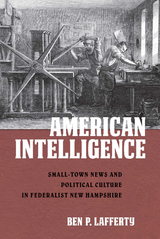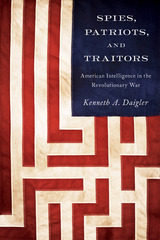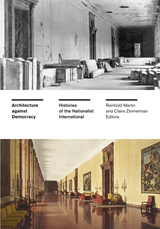
Taking up the New Hampshire newspaper industry as its case study, American Intelligence unpacks the ways in which an unprecedented quantity of printed material was gathered, distributed, marketed, and consumed, as well as the strong influence that it had on the shaping of the American political imagination. Ben P. Lafferty also considers the lives of the printers themselves and asks why so many men chose to pursue such a fraught and turbulent profession. This snapshot resonates with the contemporary media-saturated and politically chaotic age.

Students and enthusiasts of American history are familiar with the Revolutionary War spies Nathan Hale and Benedict Arnold, but few studies have closely examined the wider intelligence efforts that enabled the colonies to gain their independence. Spies, Patriots, and Traitors provides readers with a fascinating, well-documented, and highly readable account of American intelligence activities during the era of the Revolutionary War, from 1765 to 1783, while describing the intelligence sources and methods used and how our Founding Fathers learned and practiced their intelligence role.
The author, a retired CIA officer, provides insights into these events from an intelligence professional’s perspective, highlighting the tradecraft of intelligence collection, counterintelligence, and covert actions and relating how many of the principles of the era’s intelligence practice are still relevant today. Kenneth A. Daigler reveals the intelligence activities of famous personalities such as Samuel Adams, George Washington, Benjamin Franklin, Nathan Hale, John Jay, and Benedict Arnold, as well as many less well-known figures. He examines the important role of intelligence in key theaters of military operations, such as Massachusetts, New York, New Jersey, Pennsylvania, and in General Nathanael Greene’s campaign in South Carolina; the role of African Americans in the era’s intelligence activities; undertakings of networks such as the Culper Ring; and intelligence efforts and paramilitary actions conducted abroad.
Spies, Patriots, and Traitors adds a new dimension to our understanding of the American Revolution. The book’s scrutiny of the tradecraft and management of Revolutionary War intelligence activities will be of interest to students, scholars, intelligence professionals, and anyone who wants to learn more about this fascinating era of American history.

Students and enthusiasts of American history are familiar with the Revolutionary War spies Nathan Hale and Benedict Arnold, but few studies have closely examined the wider intelligence efforts that enabled the colonies to gain their independence. Spies, Patriots, and Traitors provides readers with a fascinating, well-documented, and highly readable account of American intelligence activities during the era of the Revolutionary War, from 1765 to 1783, while describing the intelligence sources and methods used and how our Founding Fathers learned and practiced their intelligence role.
The author, a retired CIA officer, provides insights into these events from an intelligence professional’s perspective, highlighting the tradecraft of intelligence collection, counterintelligence, and covert actions and relating how many of the principles of the era’s intelligence practice are still relevant today. Kenneth A. Daigler reveals the intelligence activities of famous personalities such as Samuel Adams, George Washington, Benjamin Franklin, Nathan Hale, John Jay, and Benedict Arnold, as well as many less well-known figures. He examines the important role of intelligence in key theaters of military operations, such as Massachusetts, New York, New Jersey, Pennsylvania, and in General Nathanael Greene’s campaign in South Carolina; the role of African Americans in the era’s intelligence activities; undertakings of networks such as the Culper Ring; and intelligence efforts and paramilitary actions conducted abroad.
Spies, Patriots, and Traitors adds a new dimension to our understanding of the American Revolution. The book’s scrutiny of the tradecraft and management of Revolutionary War intelligence activities will be of interest to students, scholars, intelligence professionals, and anyone who wants to learn more about this fascinating era of American history.
READERS
Browse our collection.
PUBLISHERS
See BiblioVault's publisher services.
STUDENT SERVICES
Files for college accessibility offices.
UChicago Accessibility Resources
home | accessibility | search | about | contact us
BiblioVault ® 2001 - 2024
The University of Chicago Press









